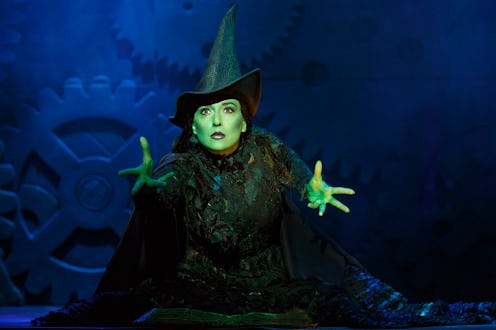Entertainment
The Real Reason 'Wicked' Is Still Relevant After 15 Years On Broadway

How is an aesthetically steampunk retelling of The Wizard of Oz that turns a character who terrorized baby boomers into a feminist icon celebrating its 15th year on Broadway? Yes, Wicked is wonderfully weird and incredibly popular — it's the sixth-longest running musical on Broadway, behind Les Miserables and Cats. But sitting down to watch Jessica Vosk take over the role of Elphaba in Wicked reminds me just how affecting the show continues to be more than a decade into its run. And that has nothing to do with outside forces, like any sudden political parallels to the Trump era in the show's plot. Instead, it's the show's depiction of how anxiety-inducing it can feel to be the "other" while on a journey to self-discovery that's the key to the show's continued success in resonating with new generations of fans.
"The show's a phenomenon," Vosk tells Bustle, sitting in her dressing room before the show. "There's a reason it's lasted this long." She's not yet in her iconic green makeup, but there's enough green residue dotting the back of her hairline to prove that playing Elphaba never really leaves you. And Vosk is thrilled to join the formidable group of women including Idina Menzel and Ana Gasteyer who have inhabited the role in the past 15 years. "It's a badass group of women," she says. "I always refer to it as the green girl sisterhood. It's like the Sisterhood of the Traveling... Hat."
For Vosk, anxiety brought her to Broadway in the first place — though the road was not simple or paved with yellow bricks. She was working in finance, denying who she was by refusing to sing or even see musicals, and started having panic attacks. "I think your body tells you those things," she says. "Your body's capable of saying, 'Something's not right here.'"
Not only is she lathering on the green paint at the Gershwin Theatre now, but Vosk has toured the country as Elphaba and even put together a one-woman cabaret show about her experiences in Oz. "I didn't know the impact that Elphaba would have on so many people," she says. "She's the only green girl that walks around on stage. She gets ridiculed. She gets bullied. She's a girl who comes into her own power and has this amazing beautiful friendship with someone that goes through a lot of peaks and valleys."
Wicked is so affecting because it embraces rather than changes the protagonist's differences.
Though it had been over a decade since I'd seen Wicked on stage, the image that still stays with me has nothing to do with flying monkeys or traveling by bubble. It's a moment during "What Is This Feeling" when the aforementioned green girl is on one side of the stage and the rest of the cast is on the other. Broadway theaters are huge. In theory, that staging is a poor, counterintuitive use of negative space — and yet it hits you right in the gut as a stark visual representation of what it feels like to be completely and utterly alone.
"For the first time in my life," Vosk says, "I'm understanding through storytelling what it's like to have the sh*t end of the stick, for lack of a better word, and to be somebody who is just different and can't do anything about it on the outside. All these other people who are normal are looking at this girl going, 'Ew. A, you look different. B, you sound different. You're annoying, you're boring, you're ugly. Go away.'"
She jokes that night after night, being in this position makes her momentarily doubt her real friendships with her cast mates. "It's hard," she says. "Every time you go to touch someone on stage, they are directed to move away from you. I've never played a role like that before."
It's not a stretch to say that outcasts love musical theater — any girl singing "On My Own" from Les Miserables alone in her room can tell you that. But part of what makes Wicked so affecting is that it's a show about embracing rather than changing the protagonist's differences.
"I try and steer clear of being like, 'Oh, just be who you are,'" Vosk says. "Because it's so much harder than that. I'm 34 and I'm just fine with who I am right now. That took a long time." Perhaps the reason that Wicked has persisted in popularity for so long is because this is a message we need to keep hearing over and over.
It's also, as any girls who tearfully sing "For Good" to each other at the end of camp can tell you, a story about two totally different women, Elphaba and Glinda, that doesn't judge either of them for their respective strengths and weaknesses. "Girl power is the best. Female bad*ssery is the best. Lady bossness is the best," Vosk says. "Both of the witches in this show are lady bosses in their own right." So is Vosk herself, let's be real.
When she was younger and singing along to the Wicked cast album in the car, Vosk says she always wanted to be Glinda, so it's a bit of a role reversal that she stepped into the green skin of Elphaba. But Vosk's debut album Wild and Free, which reached its fundraising goal in just three days on Kickstarter thanks largely to the support of fans she connected with on the road, also embraces the lighter — dare we say Glinda-esque — side of being a burgeoning Broadway superstar. On it, Vosk covers some pop hits alongside show-tune staples. "We can all be a little bit of both [Glinda and Elphaba]," Vosk says. "We really really can." It's a matter of acceptance. Nobody is just one thing, and everyone deserves to be looked at as more than a sum of their parts. That's what Wicked is all about.